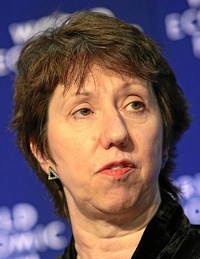The European Union, most often preoccupied with its economic problems over the past few years, grappled with two strategic challenges last week. The first involved a tug-of-war with Russia over Ukraine. The second centered on Geneva, where the union’s foreign policy chief, Catherine Ashton, chaired talks on Iran’s nuclear program. The EU appeared to fail the first test, as Ukrainian President Viktor Yanukovych stepped back from approving an association agreement with the bloc under pressure from Moscow. By contrast, the Geneva negotiations culminated in seeming success, as Tehran agreed to temporarily curtail its uranium enrichment in exchange for mild sanctions relief while talks for a comprehensive deal continue. U.S. Secretary of State John Kerry lauded Ashton’s “stewardship” of the process.
The two episodes offered something that European foreign policy debates often lack: excitement. Discussions of Brussels and the world frequently oscillate between grand statements of principles and institutional minutiae. Yet the stakes in Ukraine and Iran are real and significant. Ukraine has become a trial of the EU’s ability to manage its unruly neighborhood and stop Russia from reasserting control over former Soviet states. Iran has tested Europe’s ambitions to project diplomatic clout in the wider world.
The EU has long aspired to be both a regional and global power. The union’s leaders articulated these goals in the first—and so far only—European Security Strategy in 2003. Developed by Ashton’s predecessor, Javier Solana, to mitigate the damage done to European unity by the Iraq crisis, the strategy prioritized “building security in our neighborhood” and “an international order based on effective multilateralism.” The document will reach its 10th birthday this December. Is it still fit for purpose?

